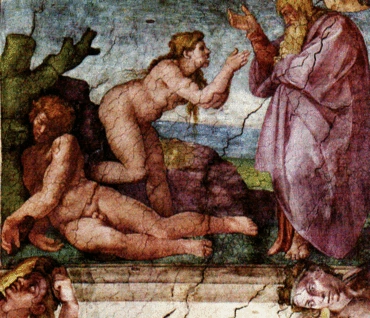Spiegazione di Genesi 2:24
Da Brian David (tradotto automaticamente in Italiano)

Questo verso usa "uomo" in senso maschile, intendendo pensieri e idee nell'intelletto. Lasciare il padre e la madre significa lasciare il precedente stato di consapevolezza spirituale interna, e unirsi a sua moglie significa essere uniti invece con la consapevolezza esterna della vita. Essere una sola carne significa che l'interno dell'uomo e l'esterno della moglie erano insieme come una sola cosa nella vita.
Il popolo della Chiesa antichissima voleva vivere da se stesso. Così il Signore creò in loro la capacità di sentirlo, anche se ciò significava che dovevano scendere dalla consapevolezza spirituale di cui avevano goduto. Ma non erano persone cattive; amavano ancora il Signore e desideravano essere buoni. Volevano solo sentire che lo stavano facendo loro stessi. Facendo in modo che l'uomo si unisse alla moglie, il Signore permise agli stati interni superiori delle persone di entrare nella loro vita esterna e di essere parte di quel senso di sé, in modo che potessero davvero amare il Signore come da se stessi.
(Riferimenti: Arcana Coelestia 160, 161, 162)
Arcana Coelestia #3413
3413. 'And filled them up with dust' means by means of earthly things, that is, by means of self-love and love of material gain. This is clear from the meaning of 'dust' as such, dealt with in 249. The meaning is that those who are called 'the Philistines', that is, who are not concerned with life but with doctrine, efface interior truths by means of earthly loves, which are self-love and love of gain. Because of those loves they are called 'the uncircumcised', 2039, 2049, 2056, 2632. Indeed people who are under the influence of those loves cannot avoid 'filling up the wells of Abraham with dust', that is, effacing the interior truths of the Word by means of earthly things, for there is no way in which they are able from these loves to see spiritual things, that is, things which belong to the light of truth from the Lord. In fact those loves introduce darkness, and this banishes that light, for as stated just above in 3412, as the light of truth from the Lord draws nearer, people who are concerned with doctrine alone and not with life are plunged into complete darkness and stupidity. Indeed they become like those in a rage, doing all they can to destroy truths in every way. For self-love and the love of gain are such that they do not allow any truth at all from the Divine to come anywhere near them. Nevertheless those people are able to boast of and pride themselves in the fact that they know truths; indeed they proclaim them with seeming zeal. It is however the fires of self-love and love of gain which inflame them and spur them on, and their zeal is merely the enthusiasm fired by those loves. This becomes quite clear from the fact that even though truths run counter to such persons' actual lives they are able to proclaim them with the selfsame zeal or enthusiasm. These are the earthly things which block the Word itself, the fountain of all truth.






